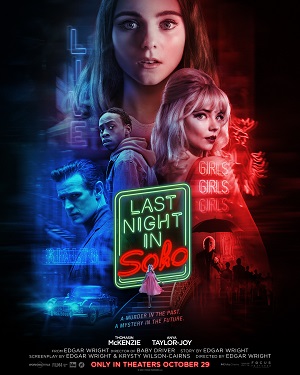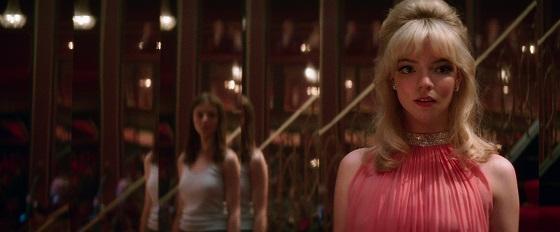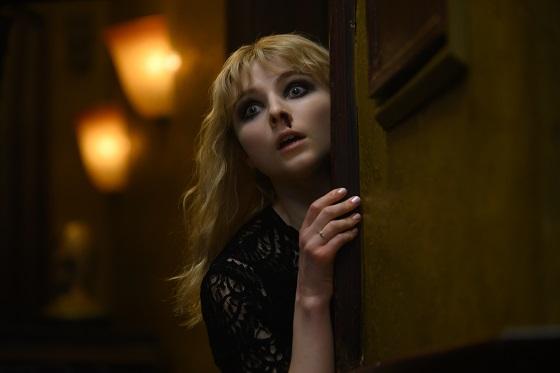

[Rating: Swiss Fist]
Opens in theaters October 29.
Edgar Wright doesn’t make bad movies: it’s just not his thing. Blessed with an encyclopedic knowledge of cinema and a music critic’s discerning taste, the writer/director uses each of his projects to explore stacked layers of genre with his unique visual and musical flairs. Whether it’s a rom-com combined with zombie horror or 90s cop action crossed with countryside murder mystery, Wright always manages to carve out space for distinctive character development within familiar, albeit blended, lanes. And while Last Night in Soho is the slick-looking, toe-tapping good time fans of his previous work might expect, it is thinner through the middle than most of Wright’s stuff.
Still, the premise is interesting, and maybe that’s what gets the picture in trouble, as the narrative oxygen gets burned up mighty quick in this one. Ellie Turner (Thomasin McKenzie) is a 21st century Cornwall gal headed out of the sticks and into London for fashion college when the audience meets her. A bit sheltered and shy, Ellie has a difficult time fitting in with her classmates, and after a bit of bullying, moves out of the dorms to rent a flat from a kindly old woman, Ms. Collins (Diana Rigg).
When she goes to sleep Ellie is shocked to discover that her new apartment is more than just a 1-bedroom walk-up, it’s a portal to London’s west end circa 1966. Although she has no real control over things and is more of a spectator, Ellie experiences the swinging 60s via a 1st person POV play-thru of sorts, where she’s a confident, charismatic young woman named Sandy (Anya Taylor-Joy). A fun little romp through a time period she adores (her fashion drawings attest to this), Ellie is having a blast at first, yet begins to see the darker side of things once Sandy’s story takes an unfortunate turn. As Ellie learns more about what happened to her 60s counterpart, and how a sleazy club promoter, Jack (Matt Smith), is involved in it all, she races to do…something.

The set-up works well enough and keeps the audience interested through the first act, yet the larger piece never feels more fleshed out than what one might expect from a Twilight Zone or Black Mirror episode. There is a reveal in the last third of the film that answers questions about who Sandie was and what happened to her, yet the “why” of it all never has its moment. Granted, Wright is paying homage to the Hammer films of the 1960s in both style (rich color palettes) and content (sexy violence), and those films never seemed to care about connecting all the narrative dots. Yet perhaps for the first time in his career, Wright never quite elevates that rougher material with his brand of precision filmmaking, where no plot thread is left behind and leads get fully fleshed out arcs.
It feels like Wright has it a bit backwards, here, like the characters are serving the fun conceit of the story instead of the other way around. The movie is also missing one of the hallmarks of Wright’s work: the humor. There are a few chuckles here and there, and Michael Ajao appears sporadically to lighten the tone as Ellie’s romantic interest, yet Last Night in Soho feels decidedly light in the “fun” department, which just isn’t something one expects from an Edgar Wright picture.

Even so, it’s not a total bust. McKenzie is a revelation in the lead role, and taps into a vein of nervous anxiety, excitement, and pensive resolution that makes her not just identifiable, but gets the audience on her side from the jump. Anya Taylor-Joy comes across as something of a cipher for most of the film, yet is no less captivating and enthralling, pairing well with her 21st century avatar. Wright’s use of the camera to transport Ellie and the audience to the 60s is both inventive and mesmerizing and finds a good match in source music that hits with all the precise impact lacking in the script (which never figures out how to use Ellie within the story’s framework).
There are several interesting thematic ideas at play in Last Night in Soho that work to varying degrees, like the way “locker room” masculinity tends to target and exploit young women (Wright makes a point to demonstrate this in both time periods). Although they come to London at very different times and for very different reasons, there is some symmetry to the journeys of Ellie and Sandy, and watching the former learn and grow from the experiences of the latter is indeed telling and interesting. Unfortunately, that’s all it is, however: a cool hook that never develops all that much. Yet as already established, Edgar Wright doesn’t make bad movies, and he hasn’t broken that streak with Last Night in Soho.
An interesting if somewhat under-baked story with captivating imagery and unparalleled needle-drops, the film is decent if unspectacular. Perhaps better suited to a shorter format that could use the thin story structure more efficiently, the film is nevertheless a fun throwback to trashy mid-20th century British suspense and horror. Like those movies, there’s not much to explore beyond the flashy exterior…and that’s okay: these movies were designed to casually entertain, not enlighten, and that’s what Wright has done, here.





Comments on this entry are closed.